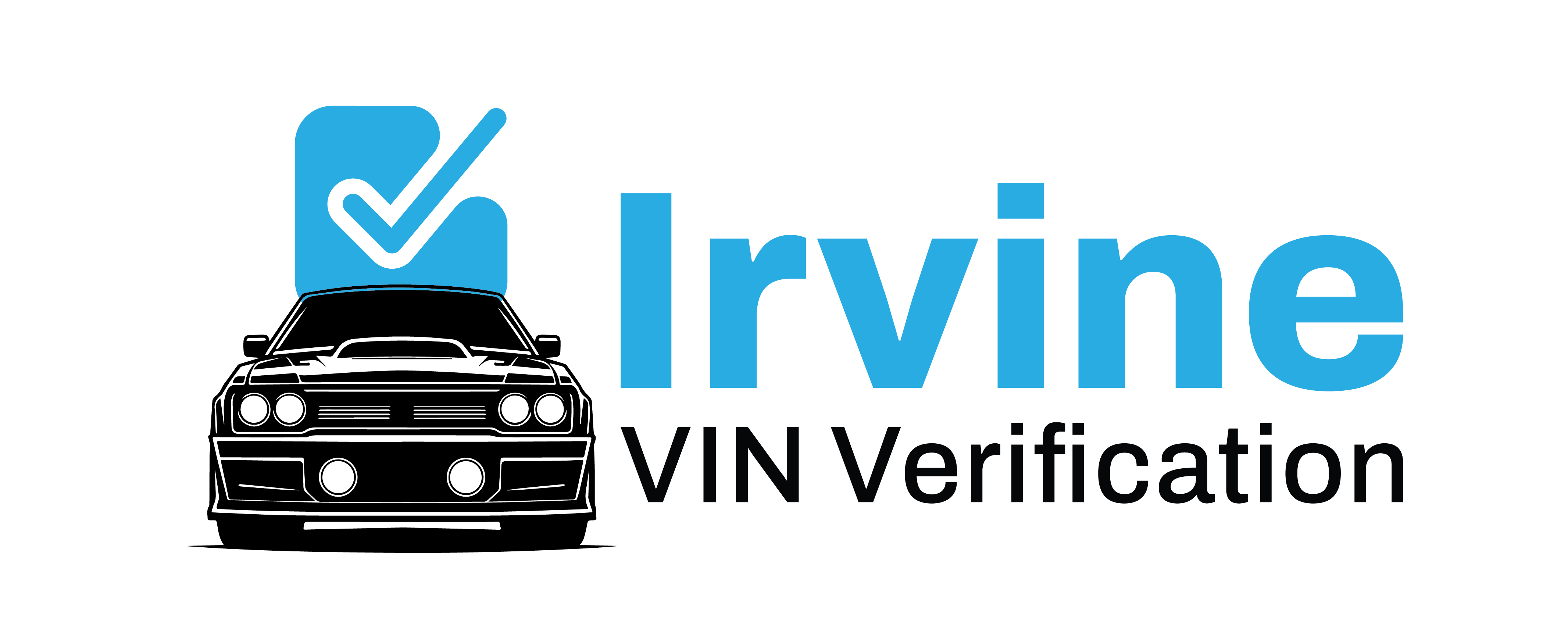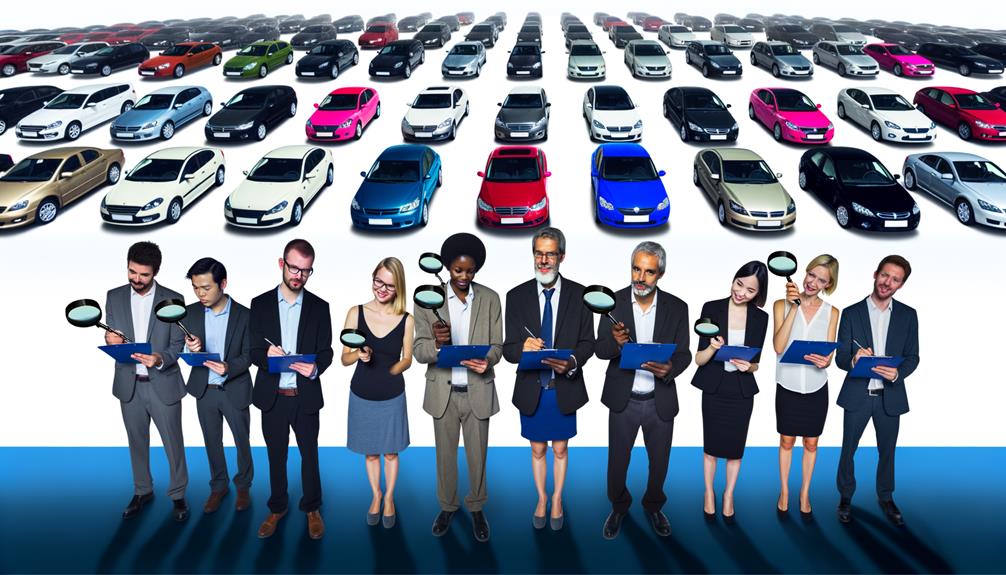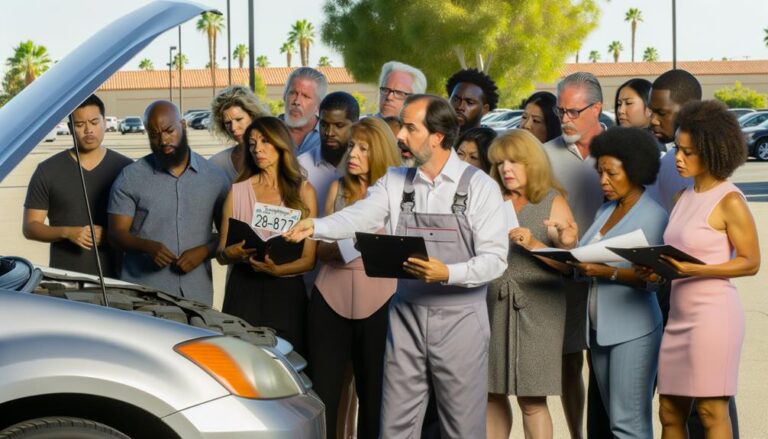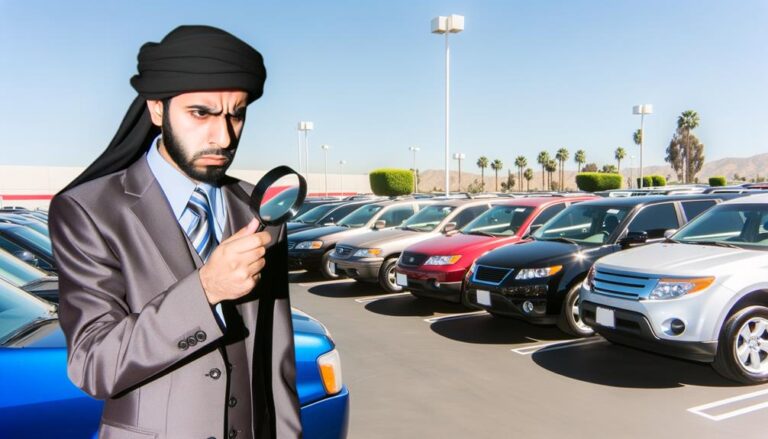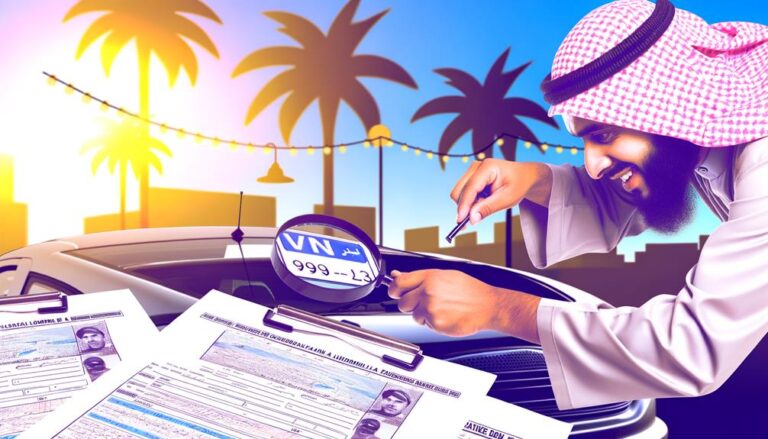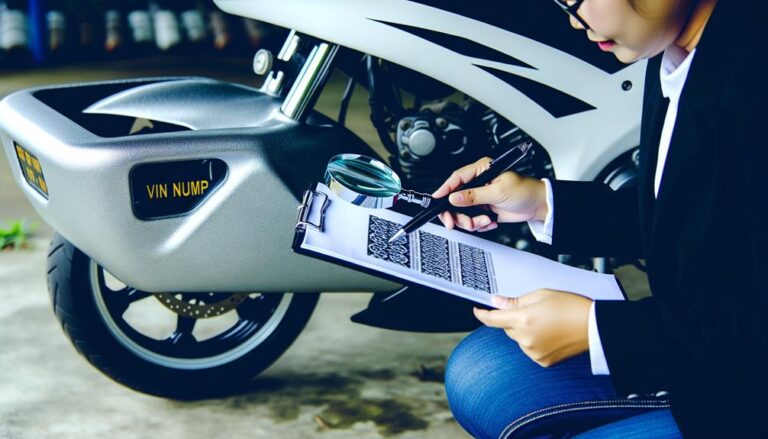You might think only functioning vehicles need a VIN check, but even classically-aged cars and those undergoing major changes, like fuel type swaps, require verification. It's also a myth that it's prohibitively costly; fees typically range from $25 to $100, and shopping around could save you extra charges from mobile verifiers. Plus, don't assume your old records vanish after seven years — maintaining detailed documentation, like the original title or repair records, is essential. Clearing up these misconceptions can safeguard you against fraud, ensuring the car you buy or sell lines up with legal standards. There's plenty more to uncover about safeguarding your vehicle transactions.
Misunderstood Eligibility Criteria

Many vehicle owners in California are often confused about the stringent eligibility criteria for VIN verification. You must know that only complete and operable vehicles qualify. That means your project car that's not yet running can't be verified just yet.
It's a common misconception that any vehicle can undergo this process right away. Particularly, classic cars need to be in a rolling chassis state; they must hit specific conditions before they're ready for the DMV's eyes.
Additionally, for those considering changing their vehicle's fuel type or configuration, VIN verification is required to guarantee compliance with state regulations.
Let's talk about your vehicle's history and registration. If your ride isn't in the DMV database, perhaps because it's from out of state or it's an older model, VIN verification becomes mandatory. This guarantees all vehicles meet California's registration standards.
Now, you might think a simple statement of facts would suffice to prove ownership, but that's not the case. Concrete proof of ownership is essential. Historical title records might vanish after seven years, so holding onto your documentation is more important than ever.
Verification Process Explained
Understanding the VIN verification process is vital if you're registering a vehicle in California. This procedure guarantees your vehicle's history aligns with legal and safety standards. It starts with a licensed VIN verifier checking your vehicle to confirm that the VIN matches the one on your documentation. This accuracy is essential for confirming your vehicle's identity is legitimate and traceable.
During the verification, the verifier also checks compliance with federal safety standards and California emission standards. This includes a thorough inspection of your vehicle's emissions label and federal certification, confirming that your vehicle meets stringent environmental and safety norms.
In addition to this, VIN Verification costs around $25 when conducted by private services, making it both a necessary and affordable step in the registration process. These checks aren't just formalities; they're safeguards that protect you from unwittingly buying or driving a non-compliant vehicle.
If you're dealing with a salvage title, the process involves a CHP Check. Here, the California Highway Patrol verifies your vehicle's odometer readings and guarantees that all repairs comply with legal standards. This salvage title VIN verification is a significant step in bringing a previously damaged vehicle back to road-worthy condition.
As you navigate the VIN verification process, remember that each step is there to protect your freedom to drive safely and legally across California.
Documentation Requirements
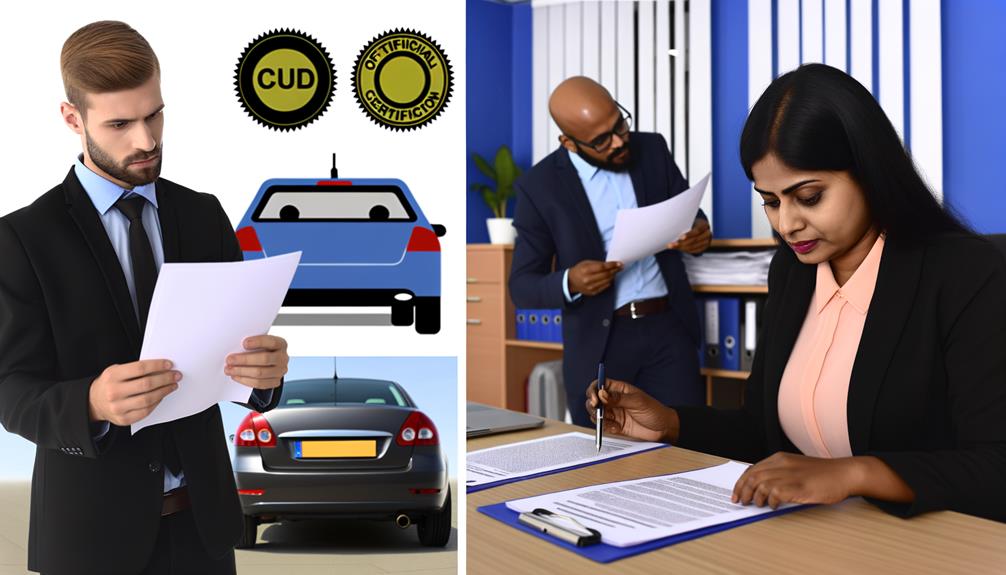
To successfully verify your vehicle's VIN in California, you'll need concrete proof of ownership, such as the original title or bill of sale. This requirement guarantees that the VIN verification process upholds your rights and freedom by preventing any disputes over vehicle ownership.
Keep in mind, title records can vanish after seven years, so it's crucial to maintain updated documentation. This includes not just your title or bill of sale but also thorough maintenance and repair records. These documents contribute considerably to establishing a clear vehicle history, which is essential during the verification.
You can't just verify the VIN yourself; you must have it checked by a licensed verifier to assure impartial inspection. This step is critical to confirm the VIN on your vehicle matches the one in your documents, maintaining VIN consistency.
Salvage Titles and Verification
If you own a vehicle with a salvage title in California, you'll need to complete a REG 31 form as part of the VIN verification process. This step is essential to confirm that your vehicle meets both federal safety standards and California emissions regulations.
The California Highway Patrol (CHP) plays a critical role in this process, ensuring that all salvage title vehicles comply with the necessary compliance regulations.
VIN verification isn't just a formality; it's about safeguarding your freedom to drive. You must prove that your vehicle is up to standard and retains a valid, visible emissions label. This label is your ticket to ensuring that your vehicle can legally hit the roads without running into trouble with state regulations.
Moreover, maintaining a detailed vehicle history and providing unequivocal proof of ownership are paramount. These documents are more than just paperwork; they're your claim to your vehicle's identity and legality. They support the VIN checks conducted by authorities, affirming that your vehicle isn't just safe to drive but also rightfully yours.
Navigating the VIN verification process with a salvage title might seem intimidating, but it's a clear path to restoring your vehicle's integrity and your peace of mind.
Out-of-State VIN Checks
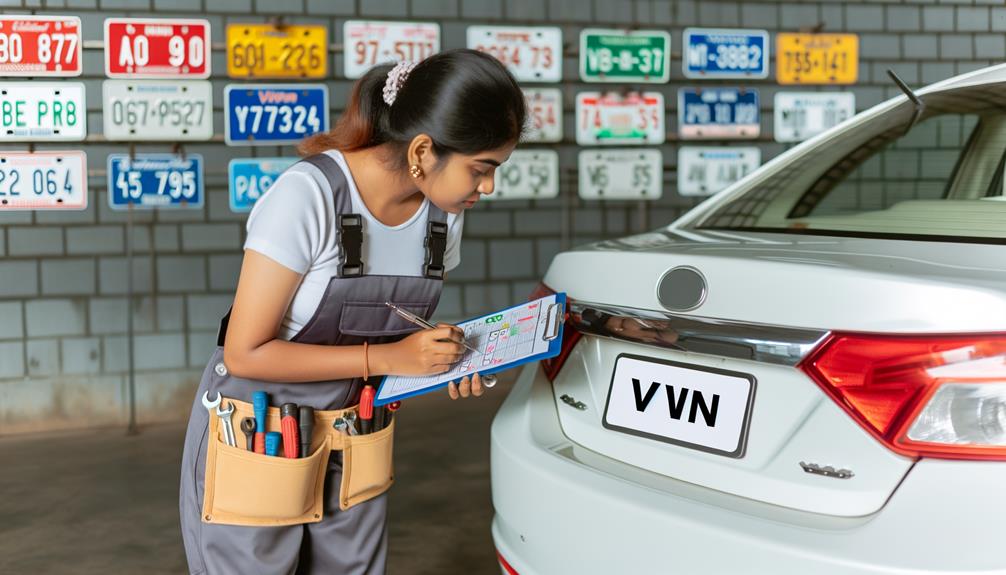
When bringing a vehicle from outside California, you'll need to undergo a VIN verification to confirm it meets state and federal standards. This step is essential, especially if you cherish the freedom to explore the golden state's roads without legal hiccups.
Out-of-state vehicles, whether they hail from the bustling streets of New York or the quiet roads of Montana, must pass a thorough inspection. This isn't just about checking the VIN location; it's about making sure your vehicle sports the correct emissions label and holds the federal certification needed to comply with stringent California regulations.
The California Highway Patrol (CHP) takes the helm in this process, meticulously verifying that your car aligns with both federal safety and California's own emission standards.
Don't forget to bring all necessary documentation such as prior titles or registrations. These papers are your keys to proving ownership and detailing your vehicle's history, paving the way for a smoother verification process.
Additionally, brace yourself for a smog test. This isn't just another box to tick; it's an essential check to make sure your vehicle respects California's air quality laws.
Embrace this process, as it certifies your ride's readiness for California adventures.
Verification Costs Myths
Many people mistakenly think that VIN verification is a free service; however, you'll typically find that costs range from $35 to $100.
It's essential to grasp that, depending on your geographic location and the verifier's setup, the fees can vary. If you're opting for mobile verifiers, remember they might tack on travel fees, making it pricier than the standard in-person service.
Let's clear up another misunderstanding: not all verifiers are out to pinch your wallet with unexpected charges. Many licensed verifiers offer package deals or discounts, especially if you require multiple services.
It's all about asking the right questions upfront and ensuring you're aware of the total costs. This proactive approach will help you steer clear of any surprises that might restrict your freedom to manage your budget effectively.
Before you commit, do a bit of homework. Compare the offers from different verifiers and don't shy away from negotiating to secure a deal that suits your needs.
Fraud Prevention and VINs
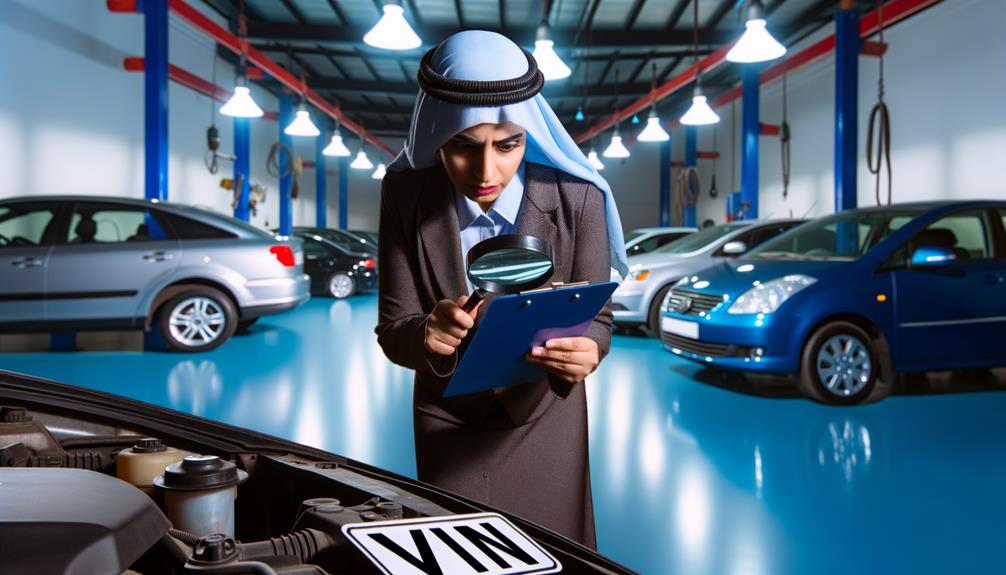
VIN verification serves as a critical shield against fraud by confirming that a vehicle's identity aligns with official records. When you're buying or selling a vehicle, ensuring the VIN matches up is your ticket to a secure transaction. This process isn't just about checking numbers; it's about safeguarding your freedom to engage in legitimate, worry-free vehicle transactions.
Thorough VIN inspections, like those conducted by the California Highway Patrol, are pivotal. They detect any signs of tampering, ensuring the vehicle in front of you hasn't been meddled with.
Imagine buying what you think is a clean ride, only to find out it's stolen. That's a scenario you don't want, right? Accurate VIN records play a huge role here, serving as a unique identifier that helps track down stolen vehicles and confirm their history.
Common VIN Misclassifications
Understanding VIN verification is just the start; it's also important to recognize common misclassifications that can affect the accuracy of this process. You mightn't realize it, but even a simple mistake like confusing the letters "O" and "I" with the numbers "0" and "1" in your VIN can lead to major discrepancies in your vehicle's identification. This isn't just a minor hiccup—it can skew your vehicle history reports and affect your freedom to use and maintain your vehicle as you see fit.
Older vehicles, those charming classics pre-1981, often present a unique challenge. Their VINs don't follow the modern 17-character pattern and can vary from 8 to 13 characters. If you're not careful, this can lead to significant misclassifications when compared to today's encoding rules, altering the perceived make and model of your beloved ride.
Moreover, historical records are crucial. If they're not maintained, your vehicle's past becomes a puzzle with missing pieces, complicating ownership and usage rights.
Frequently Asked Questions
Why Doesn't My VIN Number Match My Car?
Your VIN might not match due to transcription errors, using salvaged parts, or outdated documents. Double-check all VIN locations on your car and consult with the DMV or a professional for clarity.
What Can People Do With Your VIN Number?
With your VIN, people can access your vehicle's history, verify recalls, check for theft, and determine insurance premiums. Mechanics use it to get the right parts, ensuring proper maintenance and repairs.
What Year Did VIN Numbers Go to 17 Digits?
VIN numbers switched to the 17-digit format on January 1, 1981. You'll find this standard helps track and identify vehicles more effectively, ensuring your ride's history and specifics are clearly and accurately recorded.
Are All VIN Numbers Unique?
Yes, all VIN numbers are unique to each vehicle, just like your fingerprint is to you. This guarantees no two vehicles are mistakenly identified as the same, which is essential for tracking and registration.
